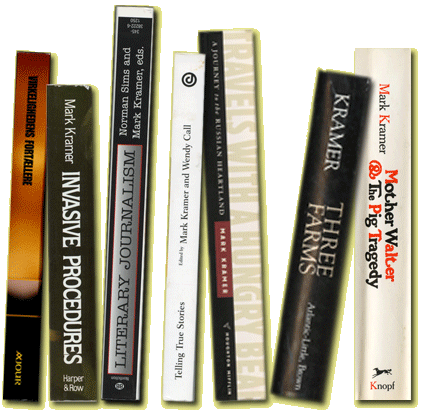
Click on a book to read its review.

Click on a book to read its review.

TRAVELS WITH A HUNGRY BEAR: A JOURNEY TO THE RUSSIAN HEARTLAND
By Mark Kramer
Houghton Mifflin, 1996
Review by: Claudia Rosett
WHY IVAN STILL CAN'T GROW WHEAT
The Wall Street Journal, A12
(Copyright 1996, Dow Jones & Company, Inc.)
7/22/1996
Many have traveled the former Soviet Union in the decade since communism began its final crumble. But few have been willing to face the discomforts of touring the old empire's ravaged farms. Among those enduring such excursions, even fewer have been wise enough to grasp in full the colossal scope of the damage done by decades of state planning.
Among this select band is Mark Kramer, whose crowning skill is that he also knows how to write. In "Travels With a Hungry Bear: A Journey to the Russian Heartland" (Houghton Mifflin, 320 pages, $24.95) Mr. Kramer brings alive the people and problems of what has remained the most backward slice of the former Soviet Union -- the farms. Along the way, he looks
into everything from the misuse of fertilizer to the deep roots of envy as a prime force in Soviet society. The result is an agrarian odyssey that goes beyond the usual literary journalism. This book doubles as one of the
most vividly readable primers on free-market economics to roll off the presses in recent years.
That's not what Mr. Kramer set out to achieve. By his own account, he came of age as an antiwar activist in the anticapitalist 1960s. Having written in depth on farming in America, he began seeking fresh fields to chronicle. Mr. Kramer's reporting for "Travels With a Hungry Bear" began in 1987, during the Gorbachev days, as a quest to discover why one of the most richly endowed nations on earth could not feed itself. "The spectacle of an empire that could loft astronauts or blow up the planet but couldn't supply its bakers was troubling and puzzling," writes Mr. Kramer in his preface.
Mr. Kramer did most of the reporting for his book before the 1991 Soviet collapse, returning for one last round in the post-Soviet dawn of 1992. This meant most of his slogging through fields and cowsheds was done under the smothering guidance of nervous Communist Party officials. The country was opening up. But unsure where the limits lay, officials escorted Mr. Kramer to showcase farms in Siberia, western Russia and Ukraine, where they mainly tried to feed him lunch.
But Mr. Kramer is a superb observer, who seizes every chance to learn more. Hit with a bout of indigestion, he plunges into a forbidden cornfield. Once there, he counts the ear-to-stem ratio to calculate the yield. He sits through butter-drenched breakfasts on a Ukrainian collective farm and emerges with a flow chart of the duplicities practiced by officials trying to run real farms while complying with surreal central plans. And as he digs into the waste of Soviet-planned agriculture, he is bowled over by insight into the source of America's contrasting bounty.
"To my chagrin," writes Mr. Kramer, "I caught myself reflecting -- no, marveling -- that the lineup of shops on a Main Street, or in a mall for that matter, reflects the bountiful, even playful concentration of hundreds of thousands of private ambitions, strategies, skills and moments of tenacity." The market, Mr. Kramer figures, "however clumsily, usually urges folks to do the job right."
Meanwhile, the farmers he keeps meeting have almost boundless incentives to do the job wrong. Early in his travels, shocked by "the bedraggled fields, scrawny animals and rusty equipment of Soviet farms," Mr. Kramer begins compiling what turns into a perpetually expanding "Catalog of Faulty Practices." He notes, for example, that because the central plan did not provide for simple "extruder nozzles" needed to process soybeans into
high-protein animal feed, pigs and steers were fed less well than in the U.S., took twice as long to fatten and during that extra time needed barn space and care. "They needed twice the facilities for the same result," records Mr. Kramer.
Along with telling what was wrong, he shows the deeply intertwined nature of the problems most post-communist countries still face in trying to make things go right. For example, he comes across an enterprising farmer, Volodya, who in 1989 tried to start a private venture by leasing dairy facilities on a collective farm. The business began to thrive, only to be sabotaged by jealous members of the collective.
When Mr. Kramer makes his final swing through Russia, in post-Soviet 1992, the web of institutions that make a market society work is barely beginning to take shape. He revisits the sabotaged dairyman, Volodya, who in the raw spirit of the times has become a dealer in cloth, candy and stolen icons. "For seventy years our government tried to invent new economic laws," says Volodya. "You can't."
The only disappointment of "Travels With a Hungry Bear" is that Mr. Kramer stopped his travels too soon. Since he last visited, four years ago, much has been done to plow under the institutions of communism and plant in their place a market democracy. But some crucial rights, such as freedom to buy and sell land, are still just starting to sprout. It is time Mr. Kramer returned to take fuller measure of this post-Soviet crop and write a sequel.
Ms. Rosett is Moscow bureau chief of The Wall Street Journal.